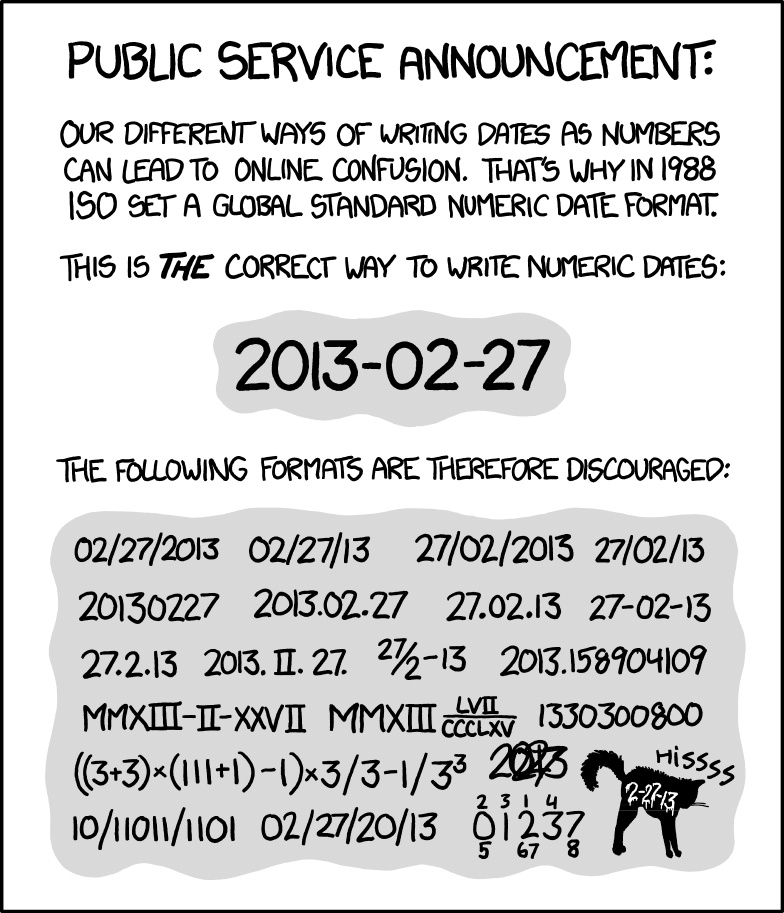I’m definitely in the “for almost everything” camp. It’s less ambiguous especially when you consider the DD/MM vs MM/DD nonsense between US dates vs elsewhere. Pretty much the only time I don’t use ISO-8601 is when I’m using non-numeric month names like when saying a date out loud.
Yeah, it’s pretty much everything for me too. The biggest exception being when UI is involved and a longhand date format would be more friendly.
Friendly to who?
The time reapers
And you can do a simple sort on the combined number and youve sorted by date.
In Canada we use MM/DD and DD/MM so you never quite know which it is! There’s an expense spreadsheet I fill out for work that uses one format in one place and the other format in another…
Holy cats, that sounds like a nightmare.
That would ruin my entire day
Hey, that sounds like my cloud storage providers auto billing system.
“Your auto renewal will draft on 08/09/23.”
Is that August 9th or September 8th? Literally depends on where the person you ask is in the world.

Can’t believe he missed the opportunity to add 41332 to the number of ways of how not to write dates.
I must be missing something.
Experience with excel.
Excel doesn’t display ISO dates unless you define a custom format.
I feel better that I don’t understand now.
They’re trying to make it look fake!
Everyone tries to make it look fake. Fuckers!
I recall writing a script that produces that 01237 with smaller digits around it for the current date. It lists the numbers that occur in the date (0, 2, 3 and 9 for 2023-09-09), the smaller digits show at which position they show up in a YYYYMMDD format (the 0 shows up on positions 2, 5 and 7)
The script has not been pushed online cause it was so dang bad
ISO-8601 over all other formats. 2023-08-09T21:11:00Z
Simple, sortable, intuitive.
Good luck using colons in a filename.
Linux has been able to handle that since the 90s.
Tough luck if you are using NTFS file system. All my homies use EXT4.
btrfs/zfs > ext4
I mean yes, but I haven’t used any of those yet, so I can’t fully agree.
Too long. Even 2023-08-09 is too long for me. But since I like the readability I use 2023.08.09. Less pixels and more readable then 20230809.
deleted by creator
My company has decided to standardized on phone numbers with dots instead of dashes. They’re in email signatures, memos, client proposals. I absolutely hate it and it rubs me the wrong way every time I see it. It’s wrong.
In Germany this is standardized, too. DIN 5008 for phone numbers. Areacode Number-extension. For example 0123 456789-01
deleted by creator
Same number of pixels, they are just different colours. But you still paid for them.
Although I actually like that format a lot, we use characters to help elicit context. 2023/08/09 is fine since we have been using / for dates for so long. Also it blows my mind why people don’t use : in 24 hour times. 16:40 is great, no am pm bullshit and you immediately know I’m talking time.
ISO 8601 is always the correct way to format dates.
ISO 8601 is the only correct way to format timestamps.
The intersection of iso8601 and rfc3339.
Christ, do this many people really find iso8601 hard to read? It’s the date and the time with a T in the middle.
I think it’s fair that programmatic and human readable can be different. If someone is putting in the month word for a logging system they can fuck right off though
If someone is putting in the month word for a logging system they can fuck right off though
That way you can sort the months of the year, in order:
- April
- August
- December
- February
- January
- July
- June
- March
- May
- November
- September
I use it all the time when writing dates.
2023-08-09: just read from the end. 9th August 2023.
As long as they use letter for months, like Jul 09, 2013 its fine. Otherwise prefer a sorted timescale version. Either slow changing to fast changing yyyy mm dd or fast to slow dd mm yyyy.
Nah, letters bring another complexity - besides with them Feb gets sorted after Dec.
what
Upvoted because I appreciate the exposure for this dating method, but I personally use it for everything. Much clearer for a lot of reasons IMO. Biggest to smallest pretty much always makes the most sense.
I do too, even in notes at work or handwritten stuff at home. I don’t always need to be reminded of the year first, but sometimes it becomes important on older stuff.
Plus when you’re in the US and work with people from Europe, the unambiguous ordering of month and day is a nice safeguard against silly misunderstandings.
…and if I don’t need the year, my eyes simply skip to the dash and continue to read from there.
ISO 8601 gang. You’d never want to describe dates that way but for file management the convenience is massive.
If you’re using a *NIX command line, something like
mkdir $(date +%F)_photosis super handy.
I do. Anything I have to put a datecode on, always gets a stamp of YYYYMMDD.
That’s not ISO8601
That is the basic format of ISO8601, hyphens are only used in the extended format which is encouraged to be used in plain text.
See ISO 8601:2004 section 2.3.3 basic format
I really wonder how americans were able to fuck this one up. There are three ways to arrange these and two of them are acceptable!
Edit: Yes, I meant common ways, not combinatorically possible ways.
Hmmm more like 6 ways but I get your point
Twelve ways if you count two-digit years. My nephew was born on 12/12/12 which was convenient.
My grandmother was born in 1896 and lived to be 102, just long enough for the pre-Y2K computer systems in hospitals to think she was a two-year-old.
Ouch!
I lost about an hour of my life trying to create a historical timeline in MS Excel. Eventually learned this is impossible with dates earlier than 1900.
this guy does combinatorics
It’s how the dates are typically said, here. November 6th, 2020 = 11/6/2020. [Edit: I had written 9 instead of 11 for November.] (We basically never say the sixth of November. It sounds positively ancient.) It’s easy to use, but I agree that YYYY-MM-DD is vastly superior for organization.
Where is here that November = 9? Probably somewhere you’ve had a long day
Oct = 8
Nov = 9
Dec = 10In metric time there are only 10 months per year
We basically never say the sixth of November. It sounds positively ancient.
When is your independence day, again?
Anyway, in Australia (and, I suspect, other places that use DD/MM/YYYY) we use “{ordinal} of {month}” (11th of August), “{ordinal} {month}” (11th August), and “{month} {ordinal}” (August 11th) pretty much interchangeably. In writing but not in speaking, we also sometimes use “{number} {month}” (11 August). That doesn’t have any bearing on how we write it short form though, because those are different things. It’s not the defence many Americans seem to think it is of their insane method of writing the short form.
When is your independence day, again?
July 4th, why?
So, not “the fourth of July” as everyone else calls it? https://en.wikipedia.org/wiki/Independence_Day_(United_States)
“Fourth of July” is the name of the holiday. It happens on “July 4th”.
“Independence Day” was a movie in the 90’s. We never say “Independence Day” around here unless the topic is Will Smith or REM.
I see this weird argumentation every time the dating system comes up 🙄
It’s kinda tongue in cheek, but that’s how we say things in my part of the US. “Fourth of July” is spoken of exactly as if it were the name of the day, like “Thanksgiving” or “Christmas”. Just like we still refer to “Cinco de Mayo” even though we don’t speak Spanish.
Obviously it’s not really called “Fourth of July”, but nobody ever says “Nth of Month” here otherwise. And I’m kinda grateful as I like “bigger to smaller” notation. Yeah, mm/dd/yyyy sucks, but saying it that way is pretty expressive because the year rarely matters. So it’s like “Hours and minutes” or (yeah, sorry Europeans) Feet and inches. Bigger before smaller quickly expresses precise information to our caveman brains. At least to my caveman brain.
Also, the movie really wasn’t that good in retrospect, but we had some sort of fever about it because it was expensive with lots of explosions, and good music licensing. And both patriots and antipatriots had something to get out of it because aliens blew up the White House.
It’s not the defence many Americans seem to think it is of their insane method of writing the short form.
I’ve never once been confused about a written date whilst in the US. Your country’s other-side-of-the-Earth flip-floppery on how it uses dates really doesn’t (and shouldn’t) impact our system, which we continue to use because it has proven effective and easy. Trying to stagnate an evolving culture/language is pointless and about as futile as trying to force a river to run backwards. If people start jumbling up how we do it here, like you say Australia does, then that will be right, too.
Saying it like that is no problem and not ambiguous. Writing it like that makes no sense though.
I’m canadian and I’ve always prefered this format for the same reason. 11/6/23 is november 6th 2023, not the 11th of June 2023, that’s weird.
As a different Canadian, I always use YYYY-MM-DD and a 24 hour clock.
Except that mm/dd/yyyy and dd/mm/yyyy can be ambiguous, I definitely prefer the former if I’m not using an ISO date. But normally I just write ISO and my head translates to MMM dd,yyyy
deleted by creator
Do people outside of the US not say dates like “June first” etc? M/D/Y matches that. It’s really not weird at all, even if the international ambiguity is awful.
In Danish, it’s said like 1st of June.
Flemish here (aka dutch-speaking). We say first June, sixth November etc. English isn’t our native language, so M/D/Y is weird as fuck and completely illogical to us.
Yes it is objectively weird.
When you write down “07/01/1967” are you unaware that it is unclear whether you’re referring to July 1st or January 7th?
And despite the fact that you’re writing something down for the express purpose of communicating information, and you’re choosing to shorten it’s written format to save time and space, you’re ok with either
a) just leaving it ambiguous and communicating poorly
or
b) having to write extra words to give it context, taking up more space than just writing out “July 1st, 1967”?
1967/06/01 clearly communicates we’re starting with the year and going biggest to smallest time increments. There is no ambiguity as to which order it’s ever in, and it’s far shorter than the full written date.
At a fundamental user experience level, it is objectively nonsensical to choose the American date format when your goals are 1) clearly communicating a date and 2) doing it shorter than writing out the words.
I like to do YYDDMM because I’m a monster.
It’s not unclear to americans. “Objectively” is hilarious here. If it’s in the format people expect, then it’s perfectly fine in context. Sorry that US traditions don’t suit your fancy.
It’s definitely confusing in an international context, but well-estsblished conventions don’t change easily.
It’s not unclear to americans. “Objectively” is hilarious here. If it’s in the format people expect, then it’s perfectly fine in context. Sorry that US traditions don’t suit your fancy.
Yes, if you chose the objectively wrong way of doing something and then tell everyone that you’re always going to do it the wrong way, then yes, people will expect you to do it the dumb way. Congratulations. That’s how choosing a protocol works. That doesn’t mean that some protocols aren’t objectively worse than others.
It’s hilarious that you think “objective” is hilarious, given that you’re reasoning is based 100% on the subjective experiences of Americans.
That’s how formats work, I hate to break it to you. The ambiguity sucks, but the format itself makes perfect sense given the way americans say dates.
The ambiguity sucks, but the format itself makes perfect sense given the way americans say dates.
We all say dates the same.
It’s objectively dumb because it’s the format that results in ambiguity. Again, the point that it’s good cause Americans are familiar with it is a subjective criteria, since it only applies to American’s experience with using it, whereas the ambiguity of an out of order time span is an objective one.
Only the combination of formats results in ambiguity. Neither format is ambiguous on its own.
Standardization is good, and if someone were to change it should probably be the US given the apparent worldwide consensus otherwise. That doesn’t make either format good or bad on its own.
What I take issue with is people acting like the US format is some kind of bizarro nonsense when it in fact makes perfect sense in terms of matching spoken dates. That is hardly a weird basis for a format.
Each has its tradeoffs, and which set of tradeoffs is better is a subjective matter. I agree that d/m/y makes the most sense for an international standard (if not y/m/d), but to claim that the US format itself is somehow objectively bad is silly.
In Germany we say things like “we meet on the twelfth fifth” (Zwölfter Fünfter), which is the twelfth day of the fifth month. Often times the year is also shortened to only the last two digits, so it could be twelfth fifth twenty-four in dd-mm-yy format.
Of course we also use the names of the months, but sometimes we just number them.
Nah, for everything.
Typisk svensk!
.
deleted by creator
I use it everywhere too. Screw the naysayers
I wish we this for work.
Not on paper documents though. Here in Europe I have to write dd-mm-yyyy.
There are two ways of writting dates: the “yyyy-mm-dd” one and the wrong one
ISO 8601 ftw. Here’s the date, time, and duration for our next meeting:
2023-08-10T20:00:00PT2H30M
But where is a timezone?
PT, Pacific time. /s
Timezone is optional, and when missing is read as local time.
In my mind, default is UTC unless otherwise specified.
luckily Local time can be any timezone!
nearly forgot that 8601 has support for durations as well
It handles ambiguity too. Want to say something lasts for a period of 1 month without needing to bother checking how many days are in the current and next month?
P1M. Done. Want to be more explicit and say 30 days?P30D. Want to say it in hours? Add theTseparator:PT720H.I used this kind of notation all the time when exporting logged historical data from SCADA systems into a file whose name I wanted to quickly communicate the start of a log and how long it ran:
20230701T0000-07--P30D..v101_pressure.csv(“
--” is the ISO-8601 (2004) recommended substitute for “/” in file names)If anyone is interested, I made this Bash script to give me
uptimebut expressed as an ISO 8601 time period.$ bkuptime P2DT4H22M4S/2023-08-15T02:01:00+0000, 2 users, load average: 1.71, 0.87, 0.68
better than the absolutely deranged MM/DD/YYYY and imo the best when it comes to international communication
I’ve been told " You don’t say 6th June, do you?" too many times
In the U.K. we do all the same. Sixth of June.
In the US it’s about 50/50 sixth of June and June sixth.
The amusing thing is that in Swedish you definitely do. Or actually “6:e juni”.
Germany too
ISO 8601 is amazing for data storage and standardizing the date.
Display purposes sure, whatever you feel like
But goddammit if you don’t use ISO 8601 to store dates, I will find you, and I will standardize your code.
epoch not acceptable then?
Epoch is also acceptable if humans don’t need to understand it
I will agree it’s a valid storage but it has to be specified in ms
I actually need to standardize my code. I’ve got “learning F2” as something I want to do soon. The goal: use the exif data of my pictures to create
[date in ISO 8601] - [original filename].[original file type termination]So a picture taken the third of march 2022 titled “asdf.jpg” would become “2022-3-3 - asdf.jpg”
Help? lol
If you’re on Linux exiftool can get the creation date for you:
exiftool -p '$CreateDate' -d '%Y-%m-%d' FILENAME, and you could run tgat in a loop over your files, something like:mkdir -p out for f in *.jpg do createdate=$(exiftool -p '$CreateDate' -d '%Y-%m-%d' "${f}") cp -p "${f}" "out/${createdate} - ${f}" doneObviously don’t justbgo running code some stranger just posted on the internet, especially as I haven’t tested it, but that should copy images from the current directory to a subdirectory called ‘out’ with the correct filenames.
ok I think I finally need to ask
What the fuck is up with the html code? Ive seen this in a lot of posts and it just throws me every time.
I don’t see any HTML when I look at that comment from Lemmy, but kbin seems to make a real mess of rendering code blocks. Basically that bit had a few lines of code they could yse to do what they wanted.
Do you mean strings like
%Y? They’re not url-encoded values - they’re strftime format directives.
I did this in the past and I would search through my notes… If I had notes ffs.
Can you give more context, what are you using? Language / system / etc?
I’m using NixOS. Ext4 filesystem. As to language, I’m not entirely sure what you mean. If you refer to the character set in the filenames, I think there are no characters that deviate from the English alphabet, numbers, dashes, and underscores.
Oh ok so you’re more so working with folder structure etc, so bash for when you plug-in a card?
I’m thinking in more programmatic terms, there’s definitely some bash scripting you can execute. Or just go balls out and write a service that executes on systemctl
I enforce ISO 8601 for the shared storage in my office. Before I got there, files were kinda stored in all kinds of formats, but mostly month first.
I tell the person under me she can store her files in her user any way she wants, but if it goes into shared storage, it’s ISO 8601. I even have a folder in there called
!Date format: YYYY-MM-DD Descriptionto help anyone else remember.Haha I did the same.
It was the Wild West, no standard, everyone used their own date format all in the same shared storage.
I’ve got most of the office doing it correctly now
Oh that’s a good idea. Thx.
YYYY-MM-DD for everything. My PC clock, my phone and even my handwritten notes all use that format.
The only other acceptable format is military notation: DD MMM YYYY.




























